 CHENNAI: A
CHENNAI: A First the figures. With the latest cut in petrol prices on Sunday, August 31, and regular increases in diesel prices by 50p, the petrol-diesel gap now spans a slim spectrum, ranging from Rs 9.15 to just over Rs 12. The gap between the two fuels in Delhi is Rs 9.54 per litre. It’s highest in
On an average, a new vehicle gives a mileage of 14-15 km per litre. For 50 km a day — the average commute distance in most Indian metros — the vehicle will, therefore, consume nearly 4 litres of petrol. That works out to about 120 litres of petrol a month.

In Delhi, the fuel differential will, therefore, save you around Rs 1,100 a month if you’re driving a diesel vehicle rather than a petrol one. Ditto for Mumbai. The
Now consider the premium that you need to fork out to drive away with your diesel vehicle, and watch the math turn topsy turvy. A typical diesel car costs at least Rs 1,00,000 more than its petrol variant.
Let’s take a common example — the Maruti
Amortized over a typical loan period of four years, or 48 months, this just over Rs 1,00,000 differential means that the cost of acquiring a diesel vehicle is at least Rs 2,000 more each month. Which means even in the more fuel-expensive cities like Mumbai and Chennai, the monthly price differential between petrol and diesel, at just over Rs 1,000, is half of the premium that buying a diesel vehicle will impose on your pocket for the length of the loan period.
This petrol-diesel math is responsible for the tide turning in favour of petrol vehicles in recent months. Top car marketers say the preference for diesel variants over petrol is down from 70:30 back in 2012 to 50:50 right now. Diesel’s small incremental price hikes mean it is nearly 14% costlier now than a year ago. Meanwhile, a decontrolled petrol price has seen some downward corrections.
However, despite the slimmer differential, diesel still scores over petrol in terms of mileage. Explained Kumar Kandaswami, director, Deloitte Touche Tohmatsu India: “Diesel vehicles offer 15-20% better mileage which petrol variants will find difficult to match. So per km cost of diesel will always be better. But there is clearly a rebalancing going on and at this rate the market should settle at a 55:45 ratio between diesel and petrol vehicle sales.”